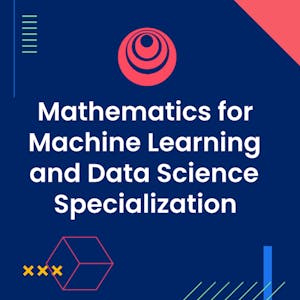Mathematics for Machine Learning and Data Science, offered by DeepLearning.AI, is a beginner-friendly Specialization designed to provide a deep understanding of the mathematical foundations of machine learning. This comprehensive program covers linear algebra, calculus, probability, and statistics, offering essential knowledge for aspiring machine learning engineers and data scientists.
Throughout the course, learners will delve into the core concepts of linear algebra, enabling them to represent data as vectors and matrices, perform vector and matrix algebra operations, and apply concepts of eigenvalues and eigenvectors to machine learning problems. The module on calculus equips learners with the analytical and visual interpretation of differentiation, enabling them to optimize functions commonly used in machine learning and perform gradient descent in neural networks.
Moreover, the probability and statistics module empowers learners to describe and quantify uncertainty in predictions made by machine learning models, apply common statistical methods to machine learning problems, and assess the performance of machine learning models using interval estimates and margin of errors.
Certificate Available ✔
Get Started / More Info
The Mathematics for Machine Learning and Data Science course comprises three modules: Linear Algebra, Calculus, and Probability & Statistics. Each module provides essential mathematical knowledge and practical applications for machine learning and data science.
The Linear Algebra module delves into the representation of data as vectors and matrices, common vector and matrix algebra operations, and the application of concepts of eigenvalues and eigenvectors to machine learning problems. Learners will gain a comprehensive understanding of linear algebra's essential role in machine learning and data science.
The Calculus module equips learners with the analytical optimization of functions commonly used in machine learning, the visual interpretation of differentiation, and the practical application of gradient descent in neural networks. This module provides a solid foundation in calculus for machine learning and data science.
The Probability & Statistics module empowers learners to describe and quantify uncertainty in predictions made by machine learning models, visually and intuitively understand probability distributions, apply common statistical methods to machine learning problems, and assess the performance of machine learning models using interval estimates and margin of errors. This module provides essential statistical knowledge for machine learning and data science.
Algorithms is a rigorous introduction to the design and analysis of algorithms, emphasizing conceptual understanding and practical applications. Prepare for technical...
Discover how to communicate with plants and fungi through translating their electrical signals into visual and auditory media using the Processing framework.
This course covers graph search, shortest paths, and data structures, offering a comprehensive understanding of their applications in various domains.
Track and locate objects in real-world video using Python and numpy to code a particle filter from scratch.